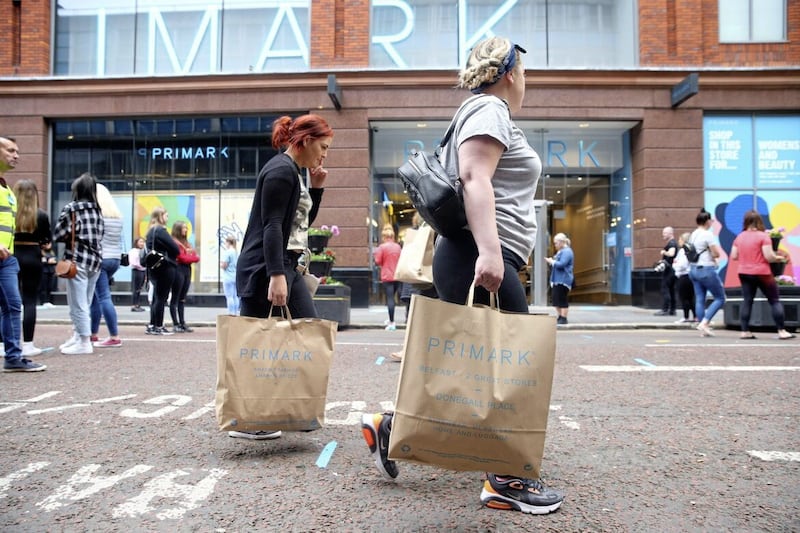An independent report into the 2021 Spend Local scheme in Northern Ireland, which offered £100 cash cards to every adult, has concluded that just over half the £137m spent by the public was used to pay for goods and services the holder would have purchased anyway.
Despite the estimated £73.4m (53.5%) of the total spend being classed as ‘deadweight’, Cogent Management Consulting LLP described it as “a highly successful intervention”, generating an estimated £1.08 in additional economic output for every £1 invested.
The Belfast-based consultancy was commissioned by the Department for the Economy (DfE) to evaluate the impact of the scheme, which cost £142.6m in total.
Its 74 page report was quietly published online by DfE just before Christmas, two years on from the height of the scheme.
Originally announced by former economy minister Diane Dodds, and implemented by her DUP colleague Gordon Lyons, the Spend Local initiative was introduced to boost the north’s economy, and in particular, support the businesses forced to close during the Covid-19 lockdowns.
The pre-paid cards, loaded with £100, were snapped up by 1.4 million adults and used over a three month window from September 27 2021 to January 7 2022.
DfE published its own analysis of the scheme in April 2022, while economists from Queen’s University also analysed its merits in May 2022, concluding that supermarkets, which were allowed to trade during lockdown, should have been excluded.
The Cogent report is the most comprehensive and detailed to date.
It said around £118m (86.5%) of the total spend was used in the retail sector, with £10.2m (7.5%) spent in accommodation and food service businesses.
Cogent estimate that 46.5% of the £137m the public spent (£63.75m) was used for goods and services the holder would not have ordinarily bought.
The report indicates this triggered another £12.2m in ‘additional expenditure’, meaning that in basic terms, the £142m scheme leveraged £76m in additional cash for businesses.
However, the report also introduces two sets of economic multipliers to calculate the scheme’s wider economic impact in terms of ‘output’ and GVA (gross value added), which measures the value goods and services produced for the economy.
The first multiplier estimates the scheme was worth £100m in additional ‘output’ terms for the Northern Ireland economy, with the second (best case) scenario estimating it was worth an additional £154.3m.
In GVA terms, Cogent’s first multiplier estimates the £100 card scheme was worth an additional £65.57m, with the second calculation estimating an additional GVA impact of £98.2m.
Using the best case scenario multipliers, and factoring in the £142.6m cost of the scheme, the report concluded that for every £1 invested, an estimated £1.08 of additional economic output and £0.69 of additional GVA was generated.
Cogent said the monetary impacts associated with Spend Local “provide a strong indication that the scheme represented value for money”.
It added: “From several perspectives, the [Spend Local scheme] was a highly successful intervention, and all the more so given its degree of novelty in a UK context.”

The extensive evaluation of the entire scheme revealed that a six week delay was caused by an unsuccessful pre-paid card bidder lodging a writ of summons in the courts.
Cogent said it prevented DfE entering into the contract with the preferred bidder for over six weeks.
The report also provides details of some anomalies found during an audit carried out by EY, which was completed in January 2022.
It revealed that despite a ban on certain merchant category codes (MCC), one holder managed to use their card to give their £100 to an unnamed political organisation.
It’s understood it occurred at the outset of the scheme and was identified quickly.
The pre-paid card provider was notified and the MCC block was successfully reapplied.
In terms of people trying to use their card for goods or services blocked by the scheme, just shy of £1.2m transactions were declined.
The majority (96%) were from automated fuel dispensers.
Ultimately the MCC block was successful in preventing 99.9% of banned transactions.
Other anomalies found during the EY audit include the 223 individuals who were able to exceed the £100 spending limit.
They were responsible for a total overspend of £10,705.
Some £9,333 (86%) of that overspend was down to individuals being issued with more than one card due to processing errors.
The remaining 14% (£1,372) arose from cases where a merchant had forced through a transaction.
The report also revealed that £780 from the Spend Local cards was accepted outside of Northern Ireland, which was also from cases where transactions were forced through.
A total of £2,333,448 of prospective transactions outside of Northern Ireland were successfully declined.








